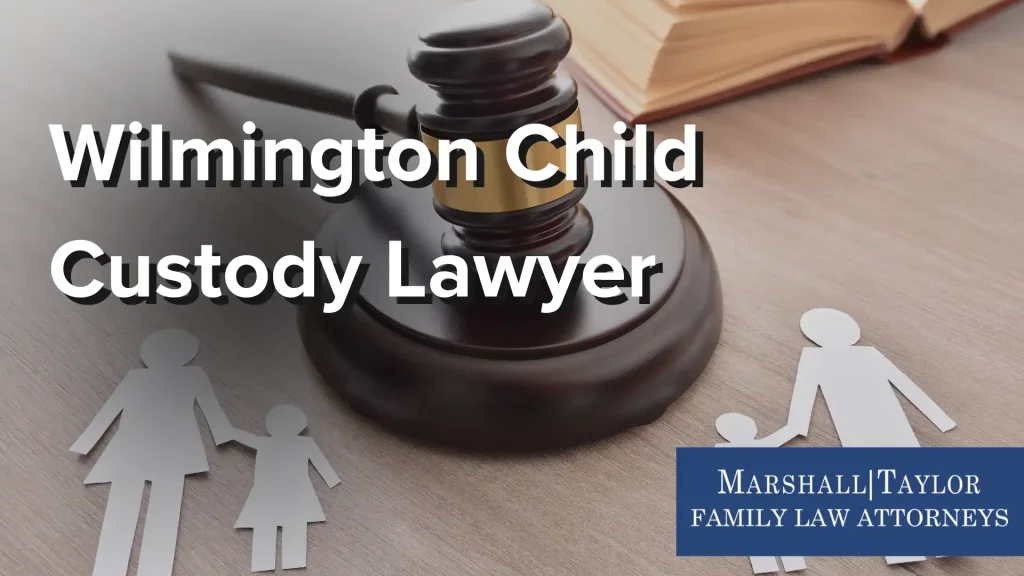
Getting divorced drastically changes your life, particularly if you have children. If you want your child involved in your life after the divorce, you must fight for custody with the right legal assistance. You can expect your child’s other parent to fight back, and you’ll need a Wilmington child custody lawyer’s help.
The Wilmington child custody attorneys at Marshall & Taylor PLLC know the stakes in these cases and can protect your family’s future. Our family law attorneys in Wilmington, NC, have decades of experience with these cases and know what it takes to achieve your goals. Our child custody law firm will handle all the legal work in your case, letting you focus on other matters. Firm founder Jeffrey Marshall is a board-certified family law specialist, demonstrating his in-depth knowledge of these complex disputes. If you’re ready to talk to a lawyer, call (919) 833-1040 now or complete our contact form for a consultation.
Why You Should Work with Our Certified Family Law Specialist
A board-certified family law specialist from Marshall & Taylor PLLC brings extensive skill and experience to your child custody case. This designation is rare and only awarded to attorneys who meet the North Carolina State Bar’s strictest standards. Fewer than five percent of North Carolina attorneys earn this certification, making it a mark of true legal excellence and ensuring you have the best legal representation.
To earn board certification, a lawyer must pass a rigorous exam, demonstrate substantial courtroom experience, and receive strong peer reviews. They must also continue their education to make sure they stay updated on changing custody laws. This means your lawyer has deep knowledge of North Carolina custody laws, parental rights, and courtroom procedures.
When choosing a child custody lawyer in Wilmington, it’s vital to remember that these cases are often stressful and emotional. Having a specialist on your side helps you navigate complex legal issues with confidence. Whether you need help with custody arrangements, modifications, or enforcement, a board-certified attorney understands how to protect your rights and your child’s best interests.
A highly skilled child custody attorney in Wilmington can also handle challenges like relocation disputes, parental alienation, and high-conflict cases. Their experience helps avoid mistakes that could cost you valuable time with your child.
Wilmington Child Custody Laws: The Basics
You don’t need to go to court if you and the child’s other parent can agree on a custody agreement. You can submit your proposed arrangement to the courts for approval, and if a judge agrees, that’s the end. However, you should still hire an attorney in these circumstances to avoid legal hiccups and protect your rights.
If you and the child’s other parent don’t agree on custody, you must find a way to resolve your dispute. You can try negotiating directly with the other parent, mediation, or other methods to find a solution. Should these methods fail, you’ll need to go to court and argue your case before a judge, navigating the complexities of the court system. In these circumstances, the judge will decide which parent gets custody, along with related issues like child support.
Finally, it’s important to remember that North Carolina doesn’t law favor one parent over the other. For instance, state law doesn’t automatically grant the mother custody and leave the father on the hook for child support. The law requires judges to make custody decisions based on the child’s best interests, no matter what the parents argue. The best way to convince a judge you are best suited to care for your child is to hire a capable attorney.
Types of Child Custody in North Carolina
There are two critical concepts to understand regarding custody arrangements. The first is legal custody. If a parent has legal custody, they have the right to make decisions for their child. For example, a parent with legal custody decides what medical care the child receives and what religious instruction they’ll get.
The second concept is physical custody. When a parent has physical custody, their child spends a significant part of their life living with that parent. The parents may not split custody time equally, but a parent with physical custody, often referred to as primary custody, has the right to spend time with their child.
Joint vs. Sole Custody
There are two main types of custody arrangements in North Carolina. The first is joint custody. In a joint custody arrangement, the parents share authority to raise the child, and the child spends time with both parents. The child might not spend equal time with both parents, but both parents are involved in the child’s life.
The other type of custody arrangement in North Carolina is sole custody. A parent with sole custody is the only one with authority to make decisions for the child. Furthermore, a child only spends time with one parent when the parent has sole physical custody. It’s rare for courts to award sole custody, but it can happen in situations involving domestic violence, substance abuse, etc.
The most common custody arrangement in North Carolina is for parents to share legal and physical custody jointly. This method keeps both parents involved in the child’s life while limiting disruptions to the child’s daily routines. In these situations, one parent may have primary physical custody while the child has scheduled visits with the other parent, or the child may live for part of the week with one parent and the rest of the week with the other.
Key Factors in Wilmington Child Custody Decisions
North Carolina courts consider many factors when making child custody decisions. Some key factors in these cases include:
- Each Parent’s Relationship with the Child – Judges look at which parent has been more involved in the child’s daily care and emotional support. If one parent has been more involved in the child’s life, they are usually more likely to receive custody.
- Each Parent’s Ability to Provide a Stable Home – Courts consider each parent’s housing, financial stability, and the ability to meet the child’s needs. These essential needs include the child’s food, clothing, and education.
- Parental Fitness – A parent’s physical and mental health, history of substance abuse, or criminal record can all impact custody decisions. A parent in poor health or one with substance abuse issues is less likely to receive custody.
- History of Domestic Violence or Abuse – If a parent has a history of domestic violence, child abuse, or neglect, the court may limit their custody rights.
- Each Parent’s Willingness to Cooperate – Judges prefer parents who encourage a healthy relationship between the child and the other parent.
- The Child’s Wishes – If the child is mature enough, the court may consider their preference when deciding custody arrangements. However, judges do not have to honor a child’s preference.
- Parental Work Schedules and Availability – A parent’s ability to provide daily care, attend school events, and offer emotional support significantly influences custody decisions.
- Continuity and Routine – Courts prefer to keep a child in familiar surroundings whenever possible, including their current school, home, and community.
- Any Special Needs of the Child – If the child has medical or educational needs, the court evaluates which parent can provide better care and support.
- Interference with Custody or Visitation – If one parent has tried to block the other from seeing the child, judges may view this negatively.
A well-drafted parenting agreement can outline the terms agreed upon by both parents regarding child custody, visitation, and other related matters.
Frequently Asked Questions About Wilmington Child Custody Cases
Here are the answers to some common questions we receive about child custody cases in Wilmington:
How long will my custody case take?
The length of a custody case depends on whether it’s contested or uncontested. If both parents agree on custody terms, the process may take a few months. If the case goes to court because the parents disagree, it can take several months to over a year, potentially increasing legal fees.
Do I need a lawyer for my child custody dispute?
While you can represent yourself, custody cases involve complex laws and high stakes for your family. Hiring a Wilmington child custody lawyer, particularly a family law attorney, can help you understand your rights, present strong evidence, and build a solid case. Furthermore, having a lawyer helps level the playing field and protects your rights if the other parent has an attorney.
How do I get sole custody of my child?
Sole custody is rare unless shared custody would harm the child. To win sole custody, you must prove it’s in your child’s best interests. Courts look at factors like the other parent’s history of neglect, abuse, drug use, or failure to pay child support. You must provide strong evidence to support your claim, such as witness testimony, medical records, or police reports.
Can I modify a child custody order?
Yes, but you must show a substantial change in your or the other parent’s circumstances since the original order. This could include a parent’s relocation, job loss, remarriage, or significant lifestyle changes. Courts will only approve child custody modifications if the change benefits the child and helps ensure their well-being.
Can a child express their preference in a custody dispute?
Yes, North Carolina courts may consider a child’s preference, but it does not determine the outcome. The judge will evaluate the child’s age, maturity, and reasoning before deciding. While older children may have more influence, the court always prioritizes the child’s best interests over their wishes.
Contact Our Wilmington Child Custody Attorneys Now
The best way to protect your interests and your family’s future during a custody dispute is to hire a lawyer for proper legal representation. Marshall & Taylor PLLC has the experience and skills to help you reach your goals. Call (919) 833-1040 now or reach out online for a consultation. Our team of lawyers can help you get the child custody arrangement that is right for you.

